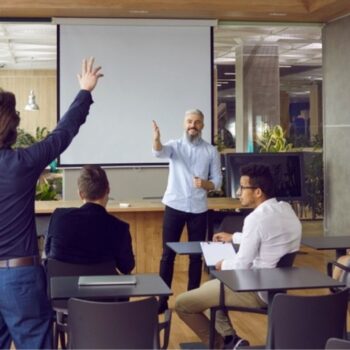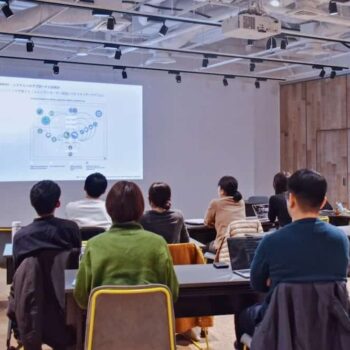![[CIRCULAR STARTUP TOKYO] Event report | Second phase kickoff event held](https://harch.jp/wp-content/uploads/2025/02/IMG_6526-min-1-825x340.jpg)
[CIRCULAR STARTUP TOKYO] Event report | Second phase kickoff event held
- On Dec 2, 2024
- Circular Economy, COS KYOTO Co Ltd, Mono factory Co Ltd, startup, タグを削除: CIRCULAR STARTUP TOKYO CIRCULAR STARTUP TOKYO
Harch Inc. hosted the kickoff event for the second phase of “CIRCULAR STARTUP TOKYO” on November 14, 2024. This startup support program, conducted in collaboration with the Tokyo Metropolitan Government, focuses on the circular economy sector.
This report covers the kickoff event, including input talks from experts practicing circular business and vision and business plan pitches from the participating teams.
Report on the “CIRCULAR STARTUP TOKYO” Phase 2 Kickoff! Lectures by Nakadai and Kamakura Investment, and Pitches from all 16 teamst
The second phase of “CIRCULAR STARTUP TOKYO,” a startup support program specializing in the circular economy, officially kicked off on November 14, 2024. This program is jointly operated by Harch Inc., which operates the circular economy media platform “Circular Economy Hub,” and the Tokyo Metropolitan Government.
This report covers the kickoff event, featuring input talks from experts actively engaged in circular business and vision and business plan pitches from the participants.
Input talks
The event opened with a presentation by Sumiyuki Nakadai, President and CEO of Nakadai Co., Ltd., on the theme of “Waste Management and the Circular Economy.” He discussed key concepts and legal frameworks related to waste management that are crucial for engaging in the circular economy through business.
Nakadai Holdings operates two core businesses:
- Nakadai Co., Ltd., which focuses on waste processing, reuse, and recycling by connecting unnecessary materials with those who need them
- Mono factory Co., Ltd., which provides advisory and consulting services to companies aiming to transition to a circular model and reduce overall waste generation.

Sumiyuki Nakadai, President & CEO of Nakadai Co., Ltd.
Nakadai began by explaining the broader framework of the circular economy:
“The circular economy, including resource circulation, can only truly contribute to a decarbonized society when combined with energy efficiency, renewable energy utilization, and initiatives for harmony with nature and local communities. These three elements are interconnected. Even if an initiative seems unrelated to the circular economy at first glance, it is crucial to consider its broader impact.”

He highlighted the necessity of having a solid understanding of fundamental waste management laws when developing circular businesses:
“Under current waste management laws, companies must first attempt to process their own waste before seeking services from licensed waste management firms. Companies that dispose of waste through unlicensed operators may be subject to fines or imprisonment. Consider this akin to traffic laws, which must always be followed. Anyone working in the circular economy must be fully aware of these regulations when building their business.”
Nakadai also introduced a new law enacted by Japan’s Ministry of the Environment in May 2024, which could play a pivotal role in expanding the circular economy:
“When facilitating the transfer of unused materials to those who can utilize them, obtaining formal waste processing approvals is typically necessary. However, as we look to expand the circular economy, it is unrealistic to expect existing waste management companies to handle everything.”
“To address this, the Ministry of the Environment introduced the ‘Act on the Promotion of Advanced Recycling Businesses for Resource Circulation.’ This law permits businesses that do not hold waste management licenses to engage in waste processing if they achieve a certain level of resource circulation. This will likely lead to a broad expansion of waste management across all industries.”
In conclusion, Nakadai underscored the need for a new supply chain framework.
“Achieving a true circular economy requires not only the traditional ‘industrial supply chain’ focused on final product delivery but also a cross-industry ‘resource circulation supply chain’ to ensure sustainable material flows.”

Following this, Kouzou Eguchi from Kamakura Investment Management Co., Ltd. (hereinafter referred to as Kamakura Investment) gave a talk on the theme “Embracing the Challenges of Transitioning from a Linear Economy to a Circular Economy!” He discussed how to communicate with investors and the mindset necessary for building a business.
Kamakura Investment is an investment trust companyfounded on the philosophy of “investing in companies that create positive impact.”
It manages and offers the publicly available investment trust “Yui 2101,” which primarily invests in publicly traded companies, as well as the “Sohatsu Tsubomi Fund,” which supports startups driving future societal change.
Eguchi opened his talk by discussing the challenges of achieving a circular economy and offering words of encouragement to the participants.
“Shifting from a linear model that has existed for hundreds of years to a circular economy is an immensely challenging endeavor. Even with well-designed circular products, shifting consumer behavior remains a challenge, as people may still choose lower-cost alternatives. Meanwhile, businesses must still generate revenue under these circumstances.
Rather than outright rejecting the current reality or those you wish to influence, I encourage you to ask, ‘Could this be a better approach?’ Continuously posing such questions is key. It is equally important to recognize the aspects of reality that are difficult to change and, from there, explore actionable solutions. I encourage all of you to adopt this mindset.”

Kouzou Eguchi, Fund Manager of Sohatsu Tsubomi Fund, Kamakura Investment Management Co., Ltd.
Eguchi then discussed institutional investors, whom participants are likely to encounter when seeking large-scale funding in the future, explaining their perspectives and concerns.
“Once your business reaches a market capitalization of 50 billion yen, you will encounter institutional investors. At first, they may seem like formidable gatekeepers, but once they invest, they become invaluable allies. They provide not only financial support but also introductions to companies worldwide, along with valuable information and data. Therefore, as entrepreneurs, you must find a way to turn them into allies.
So, what are institutional investors thinking about? Since they manage pension funds that must yield returns decades into the future, they are required to take a long-term perspective, constantly projecting 50 to 100 years ahead through a method known as backcasting.
Currently, two key areas of interest for institutional investors are ‘climate change’ and ‘circular economy.’ As climate change escalates into an uncontrollable risk for humanity, investors are increasingly advocating for regulations on corporations and governments to mitigate its impact.
Seen as a viable solution, the circular economy is now a major focus among institutional investors. A substantial shift is already underway in Europe, and this trend is anticipated to gain momentum in Japan over the next three to five years. This makes now an excellent time for you to engage in the circular economy.”
Eguchi then explained how institutional investors evaluate entrepreneurs.
“What they are most interested in is how you plan to climb the ‘high mountain’ ahead. In other words, they want to know how you will overcome the obstacles and constraints that lie in your path.
Scaling a high mountain requires a distinctive strength that is unique to you or your company. If someone asks about your strengths, can you answer immediately? If not, start building them today. Strengths can take many forms, including talent, technology, expertise, branding, or strategic positioning. The key is to establish yourself as both a leader in your field and a truly unique entity.’
Additionally, think carefully about how to communicate your strengths effectively. Utilizing industry chaos maps or trend forecasting charts are just some of the many available methods.”

Eguchi emphasized the importance of execution.
“At the end of the day, your ability to overcome obstacles hinges on execution. Investors will assess how much progress you have made when they follow up with you four months later.
During this program, take in everything investors share with you—both the positives and the critiques. Some feedback may be tough to swallow, but I encourage you to embrace it and reflect on how to respond effectively.
A crucial aspect of this process is crafting creative hypotheses. When you come across feedback that strikes a chord with you, generate as many hypotheses as possible and have the courage to take calculated risks in implementing them.”
Eguchi wrapped up by stressing the importance of turning investors into advocates for the business and its products.
“Above all, you need to turn investors into passionate supporters. Once they believe in your vision, they will be fully on your side. The process is essentially the same as cultivating loyal customers.”
Following the lecture, participants engaged in an interactive Q&A session with both speakers. Their insightful questions, which delved into key aspects of their own businesses and practical applications, showcased their deep enthusiasm and dedication.

Startup Pitches by Participants
After the talks by Nakadai and Eguchi, participants of CIRCULAR STARTUP TOKYO took the stage to deliver their pitches. Each participant had three minutes to present their company’s vision, strengths, and business model. Below is a brief introduction of each pitch.
Course A: Scaling Up, Fundraising & IPO Preparation
Masashi Shimizu / Microbiofactory Co., Ltd.
Our mission is to “transform waste into a viable circular business.” To tackle the increasing waste problem in the denim industry and comply with the EU’s waste ban regulations, we are developing technology to extract indigo dye from textile waste produced in denim factories and reuse it as a dye. Through CST, we aim to build a sustainable business model and secure funding to scale our operations. In the future, we plan to expand our operations overseas.

Ryota Hirama / 4Nature, Inc.
We are developing ‘neoharu,’ a local production and consumption platform designed to safeguard the future of food. Our goal is to create a platform for dedicated farmers who prioritize organic farming and high-quality produce, providing an alternative to the conventional agricultural supply chain. We joined CST to scale our “Community Supported Agriculture (CSA) Loop” business and revamp our brand.

Yudai Tsurusaki & Park Min / Seafood Co., Ltd.
We offer a technology-driven matchmaking service for the fishing industry that removes the need for intermediaries, helping to solve issues within the seafood industry. Through CST, we seek to accelerate our business growth, establish a circular resource model, and contribute to a sustainable fishing industry.

Shuta Nakamura / Circloop Inc.
Our mission is to normalize sustainability. We provide a reusable cup service tailored for workplaces, including offices and co-working spaces. Despite being a major solution for businesses, reusable packaging remains underutilized in Japan. Our end-to-end service handles washing, delivery, and collection, offering the same convenience as single-use options while promoting environmental sustainability. Through CST, we strive to accelerate resource circulation even further.

Yuta Ara & Yuji Harada / Ripples Co., Ltd.
We develop recyclable plastic containers with easily removable labels, ensuring clean and efficient recovery for closed-loop recycling. Through our plastic-positive initiatives, we contribute to society in multiple ways, such as creating employment opportunities for individuals with disabilities, establishing sustainable donation models for children’s cafeterias, and supporting initiatives in environmental protection, welfare, disaster preparedness, and education.

Takahiro Tsubonuma & Hanae Noda / Shibuya Fertilizer LLC
We pose the question: Can Shibuya transform from the ‘final destination of consumption’ to the ‘starting point of a new circular economy”? We are developing and implementing a circular economy model rooted in urban areas. Through CST, we seek to unlock opportunities for business expansion, extend our brand story from Shibuya to Tokyo and beyond, and create a framework that links central cities with surrounding areas.

Course B: Creating Social Impact & Establishing a Business Foundation
Hiroko Sudo / Bluebird
I joined CST with two main objectives: creating employment opportunities for people with disabilities and making a meaningful contribution to the circular economy sector. To foster a circular economy at a societal level, I believe that engaging individuals through household services can serve as a catalyst for behavioral change. I am eager to take on this challenge.

Miyu Yagami / Gaiapost Inc.
We are developing biodegradable baby diapers and implementing a system that composts used diapers rather than incinerating them, transforming them into soil for growing fruits and vegetables. When combined with waste, used disposable diapers can become up to four times heavier than their original weight, making recycling challenging. This type of waste accounts for approximately 5% of general municipal waste. The success of our business model hinges on how effectively we can connect stakeholders to establish a circular system. We aim to scale this initiative through continuous pilot projects in collaboration with local governments.

Hiroshi Isobe / Next Newman Networks Inc.
We are developing solutions to drive sustainable fashion and facilitate a circular economy in the fashion industry. Our platform allows consumers to buy and share sustainable fashion items, fostering behavioral shifts toward a circular economy. By refurbishing products, customers can maximize their lifespan, share them with other users, and refurbish them again to extend their usability even further. Our goal is to build a platform that supports and promotes circular consumption.

Atsushi Morita & Yuriko Wada / Paper Parade Inc.
The design industry is often perceived as a driver of consumption, which we recognize as a challenge. As a design firm, we advocate for urban circular design and packaging branding as core aspects of our business model. Despite their durability and recyclability, most outdoor advertisements are discarded due to intellectual property concerns. By integrating a ‘secret watermark’ to obscure intellectual property details, we seek to address these legal concerns and bridge urban spaces with fashion. Our goal is to redefine discarded outdoor advertisements as valuable, city-sourced materials with a renewed purpose.

Wang Zhenjiang / Toshiba Corporation
To promote the reuse of bulky waste through AI, we aim to develop a platform that minimizes waste by automatically assessing whether items can be resold or repurposed. We are also exploring a subscription-based model that incentivizes waste reduction through performance-based fees, and we plan to engage with local governments to discuss its implementation. Through digitalization, we will contribute to the advancement of a circular economy and the achievement ofcarbon neutrality. Through CST, we seek to collaborate with like-minded individuals who are committed to advancing the circular economy.

Masachika Nagasue / GMG Corporation
By utilizing algae, we are working on CO₂ reduction, the use of algae-based proteins, circular agriculture through composting, and the development of cosmetic ingredients derived from algae oil. Through these efforts, we strive to contribute to the realization of a circular economy while tackling future challenges such as food shortages, abandoned farmland, and environmental sustainability. Through CST, we look forward to engaging with experts from diverse fields, refining our business model, developing prototypes, and gaining insights into revenue planning.

Chol Gyu Lee
I run a business that upcycles food compost into artificial wood, promoting both waste reduction and resource circulation. By repurposing food waste—traditionally incinerated—into valuable resources, I contribute to building a sustainable society.

Akiha Matsue
I am developing a recycling system for used disposable diapers utilizing carbonization technology, along with a C2C home care matching service tailored to an aging society that will eventually transition into a high-mortality phase. My goal is to establish a new circular system that fosters both regional economic growth and environmental sustainability.

Takeo Hirata / Cyclas LLC
We strive to create a sustainable and mindful circular society where items are cherished and continuously used through care and repair. Our initiatives encompass clothing repair, circular economy events, and advisory services for circular businesses. Through CST, we seek to refine our business model, cultivate cross-industry collaborations, and contribute to a truly sustainable and sustainable circular society that aligns with nature’s cycles.

Takeshi Enomoto / University of Shizuoka
By utilizing newly developed analytical technologies, we enhance recycled plastics with the added value of ‘safety and reliability’. This initiative increases the value of recycled plastics and advances material recycling, contributing to the resolution of the plastic waste issue. Through this program, we aim to incorporate new insights and expertise from fellow participants and mentors to drive our business forward.

Following the participant pitches, a networking session was held. Attendees exchanged business cards with fellow participants and mentors while engaging in discussions about their respective businesses.


CIRCULAR STARTUP TOKYO is a platform where each participant brings their unique vision and aspirations. We look forward to seeing how their business ideas for driving the circular economy—and their own personal growth—unfold throughout the program.
[Related Page] “[Event report] “CIRCULAR STARTUP TOKYO” Phase 2 Kickoff! Lectures by Nakadai and Kamakura Investment, and Pitches from all 16 teams
[Related Site] CIRCULAR STARTUP TOKYO


![[Circular Yokohama] Received the second Kanagawa Decarbonization Award](https://harch.jp/wp-content/uploads/2026/02/datsutansotaisho_202602-300x200.jpg)




